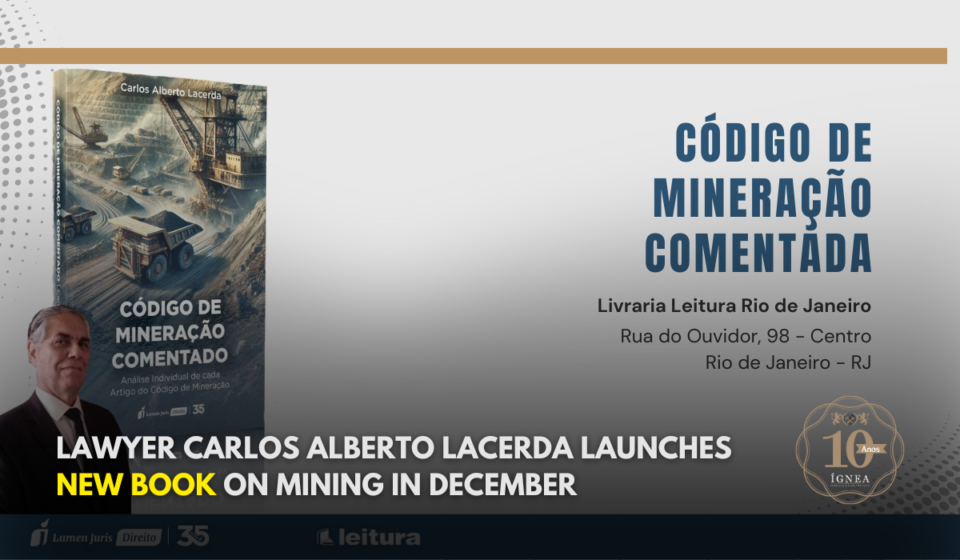“A Scholar Aware of Legal and Environmental Responsibilities”
Carlos Alberto de Melo Lacerda is a lawyer with over 45 years of experience in Mining, Civil, and Commercial Law. Graduated in Law from Cândido Mendes University in Rio de Janeiro, with a master’s degree in Geosciences from UNICAMP and a degree in Environmental Sciences from UFRJ, he has built a solid career in the mining sector. Although at age 20 he couldn’t foresee where his choices would lead him, today Carlos boasts a successful career.
Author of the book Comentários ao Código de Mineração do Brasil (Comments on the Brazilian Mining Code), written with his father, Lauro Lacerda Rocha, Carlos will launch his next work, Código de Mineração Comentado (Commented Mining Code), on December 4, 2024. In this interview, he discusses his career, the challenges of Mining Law, and future prospects for the sector.
ÍGNEA: You’ve been in the Mining Law field since 1977. What are the main changes you’ve observed in the Brazilian mining sector over these decades?
LACERDA: The Mining Code has undergone several changes since its enactment in 1967, but the basic rule for obtaining priority remains intact, although the Dilma Rousseff government attempted to abolish this system. As a scholar of the subject, I understand that the major change in mining legislation occurred with the creation of the National Mining Agency (ANM) in 2017, which replaced the former National Department of Mineral Production (DNPM). This is because the way administrative disputes are judged is now decided by the ANM’s Collegiate Board (5 members) in a public electronic meeting where interested parties can even speak to defend their rights. In the past, the decision was made by the then Director-General of the DNPM without the participation of interested parties. However, some final decisions are submitted to the Ministry of Mines and Energy (MME) for review. A change that is worrying many mining entrepreneurs and professionals is the resolution imposing sanctions on miners for infractions, with fines reaching up to 1 billion reais.
ÍGNEA: The Financial Compensation for the Exploration of Mineral Resources (CFEM) is a recurring topic in the sector. How do you assess the evolution of this institute over the years?
LACERDA: In 2000, my master’s dissertation was approved by UNICAMP (São Paulo), which addressed the “Legal Nature of Mineral Financial Compensation.” At the time, there was much discussion among jurists about the possibility of the CFEM being a tax. I argued that it was a public price, in the form of a “royalty.” To my delight, the Supreme Federal Court (STF) ruled that the CFEM is not a tax but a public price (“royalty”). Several lawyers have already written books about the CFEM, which has undergone some changes in recent years. In fact, the CFEM is a reasonable levy, but because there is no oversight in the application of the collected resources, it ends up being misapplied, which is regrettable.
ÍGNEA: You have participated in various administrative and judicial processes. Is there any case or project that has been particularly challenging or memorable in your career?
LACERDA: We lawyers have to deal with clients’ problems. I’ve had several complicated cases, involving even deaths, usually in areas where there were garimpeiros (illegal miners). This does not mean that all garimpeiros are dangerous. However, a portion of them end up working in illegal mining due to a lack of job opportunities or because they cannot work in cities. There are also curious cases, usually involving precious or semi-precious stones, as these are areas of great interest to small miners, and thus there are many land ownership conflicts. For reasons of professional ethics, I prefer not to disclose the cases I participated in, which were many.
About Your Books
ÍGNEA: In your new book, “Código de Mineração Comentado,” which will be released soon, what can readers expect that is new compared to your previous work?
LACERDA: This work is more comprehensive and robust, as I analyze and comment on each article of the Mining Code. Whereas in the previous book, in partnership with Lauro Lacerda Rocha, my father, we jointly analyzed several subjects of the Mining Code.
ÍGNEA: You are launching your second book in 2024. What is the role of academic production in building a more robust and efficient legislation for the mining sector?
LACERDA: As is known, knowledge is the key that opens the future, so I was motivated to write the book precisely to express my experience acquired over decades of working in the area of Brazilian mining law. Honestly, I hope I can contribute to the improvement of doctrine in the area of Brazilian Mining Law.
“Knowledge is the key that opens the future.”
About the Future of Mining
ÍGNEA: How do you see the future of mining in Brazil in the next 10 years, considering the energy transition and the increasing pressure for more sustainable practices?
LACERDA: There are countless difficulties that miners have to overcome to extract mineral resources. Despite this fact, the conscientious miner has the ability to invest correctly for years in the hope that their project will succeed. Therefore, the miner must be a person who believes in the future; otherwise, they will give up at the first difficulty.
It is worth reinforcing that the book launch will take place on December 4th at Livraria Leitura. The address is Rua do Ouvidor, 98 – Centro Rio de Janeiro (RJ), from 4pm to 6pm.














